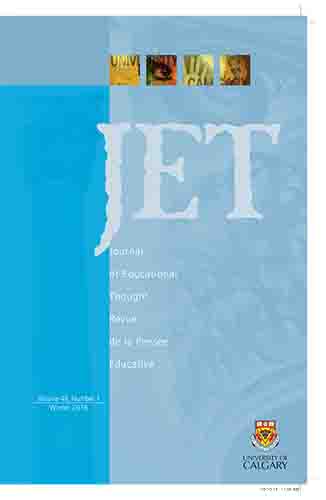Utopia, Dystopia and the Struggle for Redemption: Iris Murdoch and Educative Attention
DOI :
https://doi.org/10.55016/ojs/jet.v49i1.46296Résumé
Where educationists have addressed the work of Iris Murdoch, they have focused almost exclusively on her non-fiction writings. This relatively limited canvassing of possibilities in Murdoch’s corpus is somewhat surprising, for when we turn to her novels, educational contexts and themes, broadly conceived, figure prominently. Murdoch’s novels provide nuanced studies of the varied processes of human formation, lending weight to the view that fiction has much to teach us about bildung and the idea of ‘learning from life’. Murdoch’s concern with the particulars of human growth and becoming – with what A.S. Byatt calls the ‘thinginess’ of the moral and physical world – also points us toward a distinctive orientation to utopia. While the common construct of utopia as a form of ideal social grouping is not altogether missing from Murdoch’s fiction, it is more states of inner utopia and dystopia with which she is concerned. This article takes up this idea with reference to The Philosopher’s Pupil and The Bell. In The Bell Murdoch shows that there is no safe haven from human frailties; our weaknesses not only accompany us wherever we go but in some respects define us as distinctive beings always in a process of becoming. Utopia does not sit waiting for us, guarded within the walls of a community in retreat from the world; instead, it must be constantly recreated, inwardly as well as outwardly. A key ingredient in distinguishing utopian situations from those of a dystopian nature is love, and in the pedagogical realm this can be expressed, among other ways, through attention to the Other and to the particulars of the world. The Philosopher’s Pupil provides an example of how a dystopian inner space can be created within a pedagogical relationship when attention of this kind is lacking.
Téléchargements
Téléchargements
Publié-e
Numéro
Rubrique
Licence
The Journal of Educational Thought retains first publication rights for all articles. The Journal grants reproduction rights for noncommercial educational purposes with the provision that full acknowledgement of the work’s source be noted on each copy. The Journal will redirect to the appropriate authors any inquiries for further commercial publication of individual articles. All authors wishing to publish in JET will be asked to fill in and sign a Consent to Publish and Transfer of Copyright agreement.
Authors must affirm that any submission to JET has not been and will not be published or submitted elsewhere while under considration by JET.

